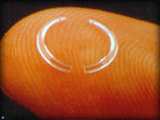Visian ICLs, Implantable Contacts in Raleigh, Durham & Cary
Implantable Contact Lenses
Considering implantable contact lenses in Raleigh? Dr. Dean Dornic offers two kinds of implantable contacts as alternatives to laser surgery for his patients with myopia, or nearsightedness: Visian™ phakic intraocular lenses (IOLs), for moderate to severe cases, and Intacs® corneal ring segments for mild myopia. All devices are implanted through tiny incisions in the eye, with no tissue removal required.
Visian Phakic IOLs
![]()
Implantable Contact Lenses (ICL) also known as phakic intraocular lenses (IOLs) can correct a wide range of vision errors by inserting an IOL (much like a contact lens) in front of the natural lens of the eye. This technique is similar to cataract lens surgery, but the natural lens remains in place so the eye’s natural focusing ability is preserved. An implantable contact lens is beneficial because it becomes a permanent fixture of the eye, avoiding time consuming maintenance. The main implantable contacts used at Laser Eye Center of Carolina are Visian.
Implantable contact lenses such as Visian also do not get lost, foggy or have to be replaced like glasses or contact lenses. ICL procedures are being used on patients with higher amounts of nearsightedness and in patients who may not be candidates for PRK or LASIK in Raleigh / Durham. Unlike laser vision correction procedures that permanently change your vision, it is possible to later remove an ICL.
How do ICLs Work?
Similar to a contact lens, the Visian ICL reacts with your natural eye to focus. The focusing power of the ICL can be determined so that it closely matches your eye’s prescription. With an ICL, surgeons don’t have to reshape the cornea. Instead, they make a small incision and inject a lens into the eye that can correct your vision problem. Because the natural lens of the eye is not removed, the patient retains the natural focusing capability of the eye for near focusing tasks.
The Visian ICL Procedure
The Visian implant surgery is quick and comfortable, lasting only about 20 minutes. You will arrive at the surgery center about two hours prior to your procedure. Once checked in, a sedative may be given as you are prepared for surgery. The area around your eyes will be cleaned and a sterile drape may be applied around your eye. Eye drops or a local anesthetic will be used to numb your eyes. When your eye is completely numb, an eyelid holder will be placed between your eyelids to keep you from blinking during the procedure.
Who are candidates for Implantable Contact Lenses?
Candidates for implantable contact lenses are nearsighted and over the age of 21. The best Raleigh / Durham implantable contact lens candidates have no significant cataract or other serious eye disease such as glaucoma, iritis, or diabetic retinopathy. Invisible and undetectable, you won’t be able to see the Visian ICL in your eye, and neither will anybody else. Exceptional quality of vision will be the only reminder that you have had 21st century vision correction.
Intacs® Corneal Ring Segments

Intacs® are well suited to our patients who want to correct mild myopia (nearsightedness) without laser surgery. They are also used in the treatment of keratoconus. These small, crescent-shaped corneal ring segments flatten the front of the eye, thereby reducing myopia.
To place Intacs®, Dr. Dornic first numbs the eye with medicated eye drops, and then makes a small incision above the cornea. Next, he inserts a ring segment on each side of the inner cornea. Typical Intacs® placement at our practice takes about 15 to 20 minutes.
Unlike laser surgery, no removal of eye tissue is required with Intacs®. This allows our Intacs patients to have other vision correction treatments, if required. If the patient is dissatisfied with his/her vision, existing Intacs® can be removed and replaced with a different thickness for further correction, or removed altogether to allow for another form of vision correction surgery, such as LASIK or PRK.
Unlike laser eye surgery, the Intacs® procedure adds new parts to the eye, but patients report that they cannot feel them. If there is no change in vision, the Intacs® will never need any further attention.
If you are mildly nearsighted and want to learn more about Intacs®, contact our eye center today.







